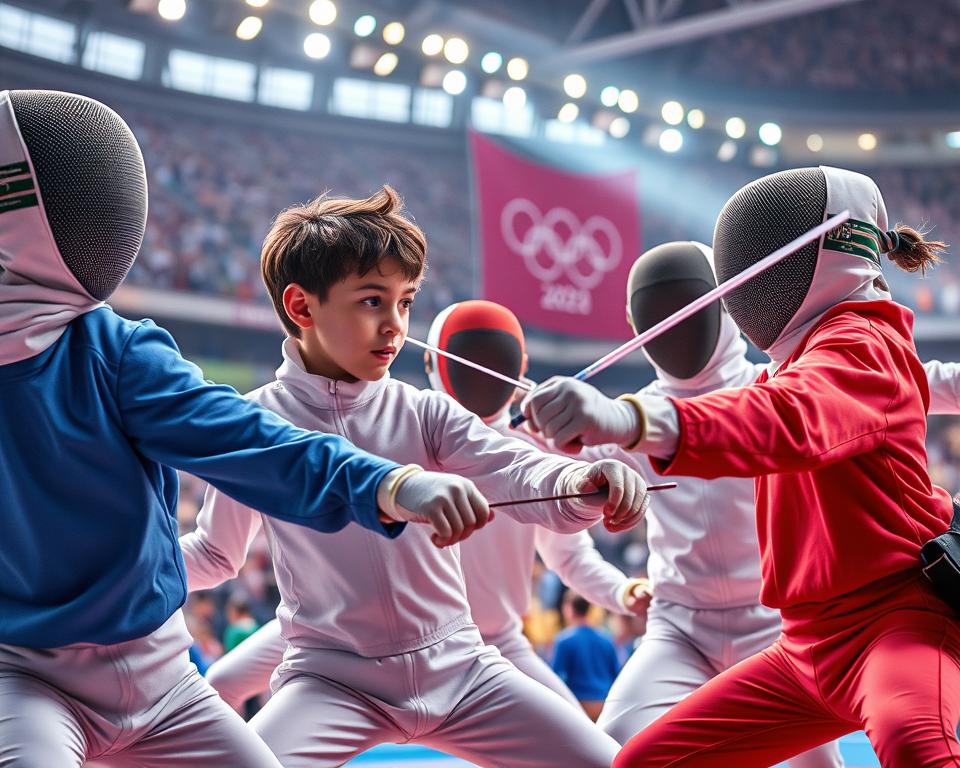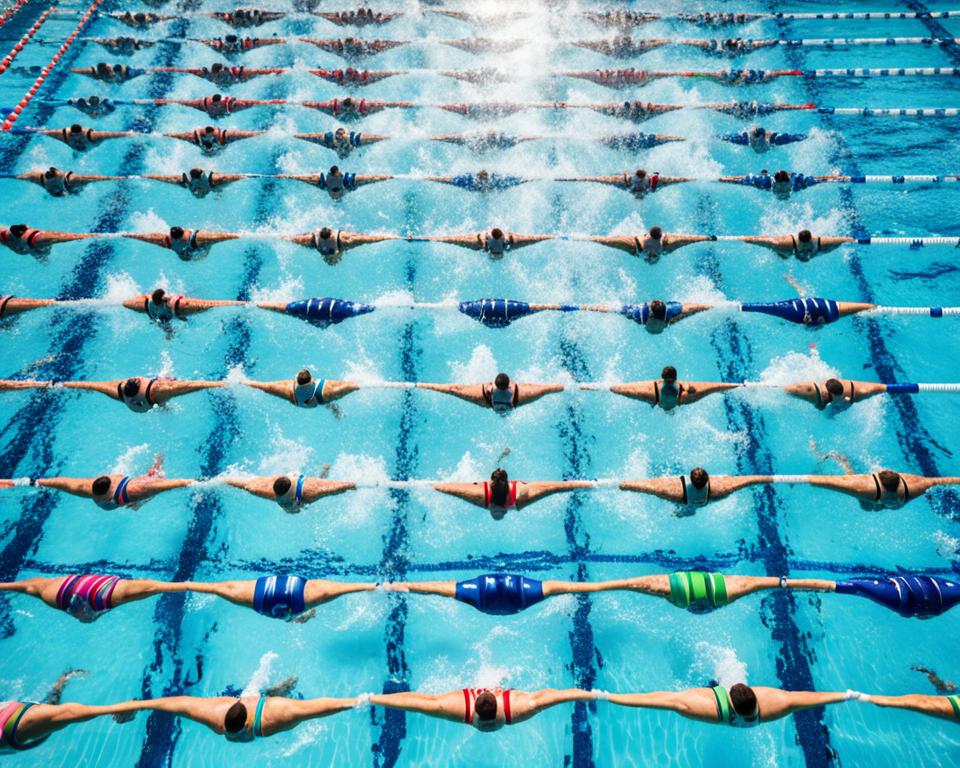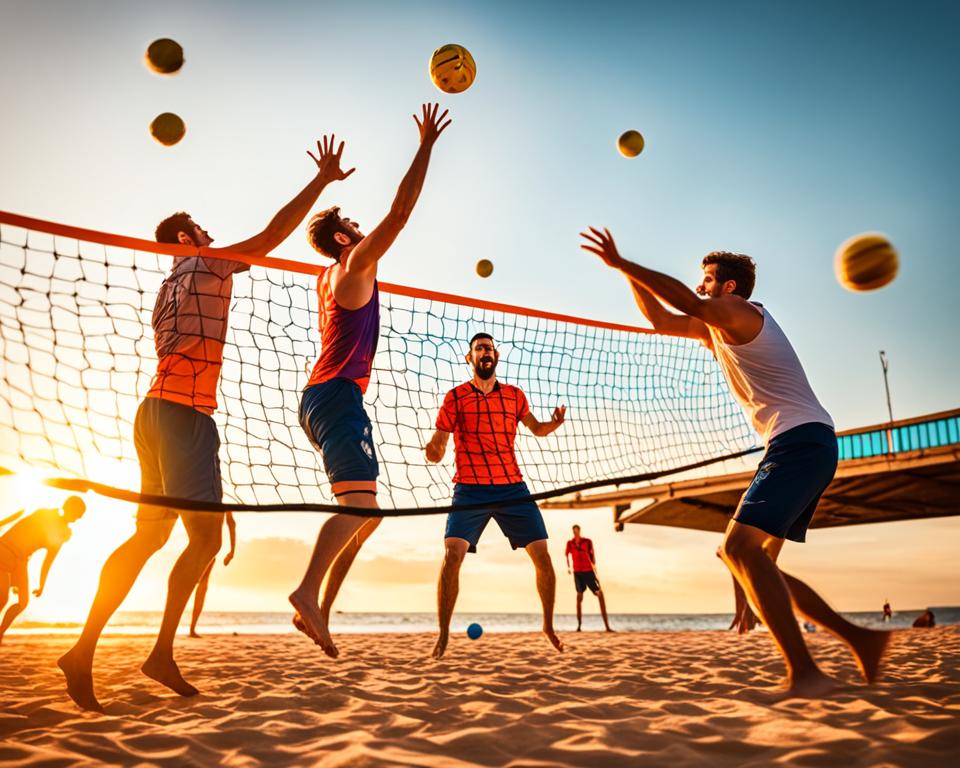Fencing is a thrilling sport that has been part of the Olympic Games for a long time. The Olympics set strict age rules to make sure the competition is fair and athletes stay safe. This article will explain the age rules for fencing in the Olympics. It will cover the minimum and maximum ages, the different age groups, and how age affects qualification and performance.
From young talents aiming for Olympic glory to seasoned athletes looking to end their careers on a high note, Olympic fencing welcomes athletes of all ages. This article will dive into the rules that govern age in fencing. It aims to give readers a clear picture of how age influences the exciting world of Olympic fencing.
Read more interesting information at ::mbp-ehime
Introduction to Olympic Fencing Age Regulations
Olympic fencing is a fast-paced sport that needs age rules to be fair and open to everyone. These rules make sure the sport is honest, keep athletes safe, and let everyone compete on an even ground.
Importance of Age Regulations in Olympic Fencing
The fencing olympics age rules and criteria look at the physical and mental differences among athletes of different ages. They protect young fencers from getting hurt and make sure they fight against others of similar skill. They also let older fencers show off their skills.
Overview of Age Categories and Divisions
Olympic fencing has many age divisions in olympic fencing for athletes from the young to the old. These include Cadet (under 17), Junior (under 20), Senior (no age limit), and Veteran (age 40 and above). Each group has its own olympic fencing age eligibility rules, helping fencers move up as they get more experienced and mature.
These age-based divisions make sure the competition is fair, help develop talent, and include athletes at all career stages. This way, the fencing olympics age rules are followed, making the fencing community at the Olympics strong and diverse.
Minimum Age Requirements for Olympic Fencing
The world of Olympic fencing has strict age rules. These rules make sure all athletes are on an even playing field. They also protect young athletes from harm. The minimum age requirements come from the Fédération Internationale d’Escrime (FIE), the top group that oversees the sport.
The FIE says you must be at least 13 years old to compete in the fencing olympics. This rule is for all three main types of fencing: foil, epee, and sabre. This age limit makes sure young athletes are ready physically, technically, and mentally for the big leagues.
The olympic fencing age requirements are there to keep fencers safe and help the sport grow. By setting a minimum age, the FIE tries to avoid injuries. It also makes sure young athletes are ready for the tough challenges of international competitions.
“The age regulations in Olympic fencing are crucial for maintaining the integrity and safety of the sport. They help to ensure that all competitors have the necessary skills and maturity to compete at the highest level.”
Remember, the minimum age requirements for fencing olympics might change in different events and programs. But the olympic fencing age requirements set by the FIE are the main rule for the Olympics and big international fencing events.
Maximum Age Limits for Olympic Fencing
In the world of Olympic fencing, age is key to who can compete. This sport needs top physical and mental skills. To keep things fair, there are set age limits for each fencing type.
Age Limits for Different Fencing Disciplines
Each fencing type has its own age limit for the Olympics: foil, epee, and sabre. These limits consider the unique needs of each weapon.
- Foil: Athletes can’t be older than 40 for foil fencing. It’s fast-paced and requires quick moves, which gets harder with age.
- Epee: Epee fencing has a 45-year-old limit. It focuses on strength and strategy, less affected by aging.
- Sabre: Sabre fencers can be up to 50 years old. It’s the most demanding, needing quick moves and strength, which older athletes might find easier.
These age rules help keep the competition safe and fair. They also ensure athletes can still perform at the Olympics’ high standard. Fencing’s demands grow as athletes get older, making these rules necessary.
| Fencing Discipline | Maximum Age |
|---|---|
| Foil | 40 years |
| Epee | 45 years |
| Sabre | 50 years |
Setting these age limits helps the Olympic fencing body. It makes sure the sport is competitive and safe for athletes.
Age Regulations for Youth and Junior Fencers
Olympic fencing has strict age rules to help young athletes grow and compete fairly. These rules make sure youth and junior fencers get the support they need. They also help these athletes improve their skills and compete at top levels.
Youth Fencing Programs and Competitions
The olympic fencing youth programs have many initiatives for the next generation of champions. They offer training, mentorship, and chances to compete. Young fencers get to learn and grow in the sport through local and national tournaments.
Junior Fencing Tournaments and Development
Olympic fencing junior competitions are very important. They help young athletes move from youth programs to the senior ranks. These tournaments show off junior fencers’ skills and help them grow, getting ready for elite-level fencing.
The age divisions in olympic fencing make sure fencers fight against others of similar skill and age. This makes competition fair and helps young fencers improve. They can move up in rank, getting better at fencing while facing opponents at their level.
“Fencing is a sport that requires a unique blend of physical prowess, strategic thinking, and mental discipline. The age regulations in Olympic fencing ensure that young athletes have the opportunity to develop these essential skills at their own pace, preparing them for the challenges of the international stage.”
fencing olympics age
In Olympic fencing, age is key for eligibility, competition types, and athlete performance. The fencing olympics age rules by the International Fencing Federation (FIE) make sure competition is fair. They also help fencers grow at every career stage.
The fencing olympics age system splits fencers into Cadet, Junior, and Senior groups. These groups depend on the athlete’s age. They let us have special competitions for each stage of a fencer’s growth.
| Age Category | Age Range |
|---|---|
| Cadet | 13-16 years old |
| Junior | 17-20 years old |
| Senior | 21 years and above |
The fencing olympics age rules also look at how aging affects fencing. As fencers get older, their skills, speed, and strategies change. The FIE’s rules help athletes compete at the right level for their development. This makes competition fair and exciting.
Knowing about fencing olympics age is important for athletes, coaches, and fans. It shows the unique challenges and chances in this sport. It helps everyone understand the athletes’ hard work and the sport’s depth.
Age Categories in Olympic Fencing
Olympic fencing is divided into age groups for fairness and to help fencers grow. These groups include the cadet, junior, and senior levels. Each level has its own rules and competitions.
Cadet, Junior, and Senior Divisions
The cadet division is for fencers aged 13 to 16. It’s a chance for young athletes to improve their skills and get competitive experience. Fencers aged 17 to 20 can join the junior division to keep improving and get ready for the senior level.
For fencers 21 and older, the senior division is the top level. Here, the best athletes from all over the world meet to compete for Olympic medals.
| Division | Age Range |
|---|---|
| Cadet | 13 to 16 years old |
| Junior | 17 to 20 years old |
| Senior | 21 years and above |
Olympic fencing uses age groups to let fencers compete fairly with others their age. This helps with skill growth and healthy competition. The olympic fencing age eligibility rules make it easy for fencers to move up from junior to senior levels. This lets them chase their dreams of competing on the world stage.
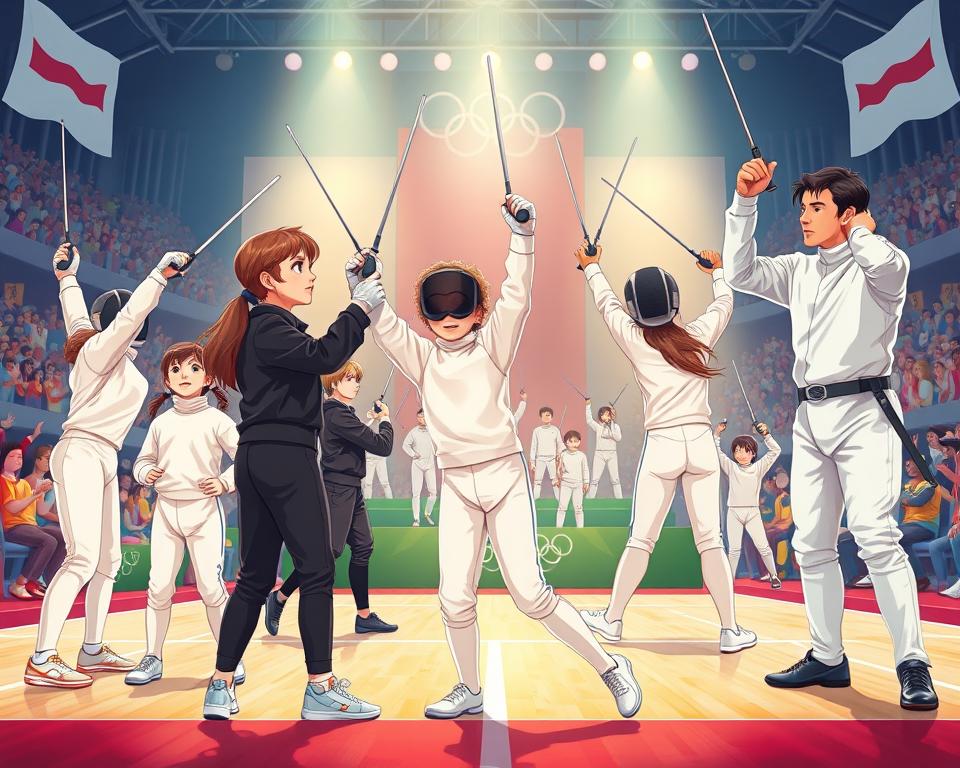
Veteran and Masters Fencing Categories
The Olympic fencing framework includes veteran and masters categories for experienced fencers. These categories are for older athletes who have spent their lives in the sport. They get to keep showing off their skills on the world stage.
Age Requirements for Veteran and Masters Fencing
To fence in the veteran category, athletes must be at least 40 years old. The masters category is for those 50 and older. These divisions let older athletes compete with others their age. It builds camaraderie and respect in the fencing world.
| Fencing Category | Minimum Age Requirement |
|---|---|
| Veteran Fencing | 40 years old |
| Masters Fencing | 50 years old |
The veteran and masters categories let fencers keep competing as they age. They honor the hard work and love for fencing of older athletes.
Even as fencing gets harder with age, these categories let experienced fencers show their skills. They highlight the tactical skill, mental sharpness, and sportsmanship of older fencers. These divisions show the lasting spirit of fencing and its timeless charm.
Age Eligibility for Olympic Qualification
To join the Olympic fencing, athletes must meet certain age rules. These rules make sure everyone has a fair chance and help grow the sport for all ages.
Qualification Criteria Based on Age
The FIE and IOC set clear rules for fencing olympic age eligibility and olympic fencing age requirements. Here are the main points:
- Minimum age: Fencers must be at least 13 years old to compete in the Olympic fencing events.
- Upper age limit: There is no maximum age limit for Olympic fencing, allowing veteran and masters-level athletes to showcase their skills on the world stage.
- Age categories: Fencing competitions at the Olympics are divided into Cadet (ages 13-16), Junior (ages 17-20), and Senior (ages 21 and above) divisions.
- Qualification process: Fencers must earn a spot on their national team through a rigorous qualification process, which often includes age-specific national and international tournaments.
These age rules make sure the Olympic fencing is fair and open to all ages. They let athletes of any age aim for the top prize in sports.
| Age Category | Minimum Age | Maximum Age |
|---|---|---|
| Cadet | 13 years | 16 years |
| Junior | 17 years | 20 years |
| Senior | 21 years | No limit |
Following these age rules, Olympic fencing gives a fair chance for athletes of all ages. It lets them show their skills and chase their Olympic dreams.
Impact of Age on Fencing Performance
As fencers move through their careers, age starts to play a big role in their performance. Aging can change both their physical and mental abilities. These changes can greatly affect how well they can compete at the top level.
Physical Aspects of Aging in Fencing
Fencing requires a lot of physical skill, like speed, strength, and endurance. As fencers get older, they might lose some of these abilities. They might have less muscle mass and flexibility, making fast moves harder.
They might also take longer to recover, which can make it tough to stay competitive in long tournaments or training sessions.
Mental Aspects of Aging in Fencing
Aging also affects fencers mentally. Skills like quick thinking, making decisions, and planning strategies can slow down. Older fencers might struggle to react fast or make quick decisions during a match.
But, their years of experience can help them stay competitive. They use their knowledge to outsmart younger opponents.
Successful fencers need to adapt to aging’s challenges while keeping their edge. They might change their training, focus on certain skills, and use their experience to beat younger foes. The impact of age on fencing performance is a complex topic that interests athletes and coaches a lot.
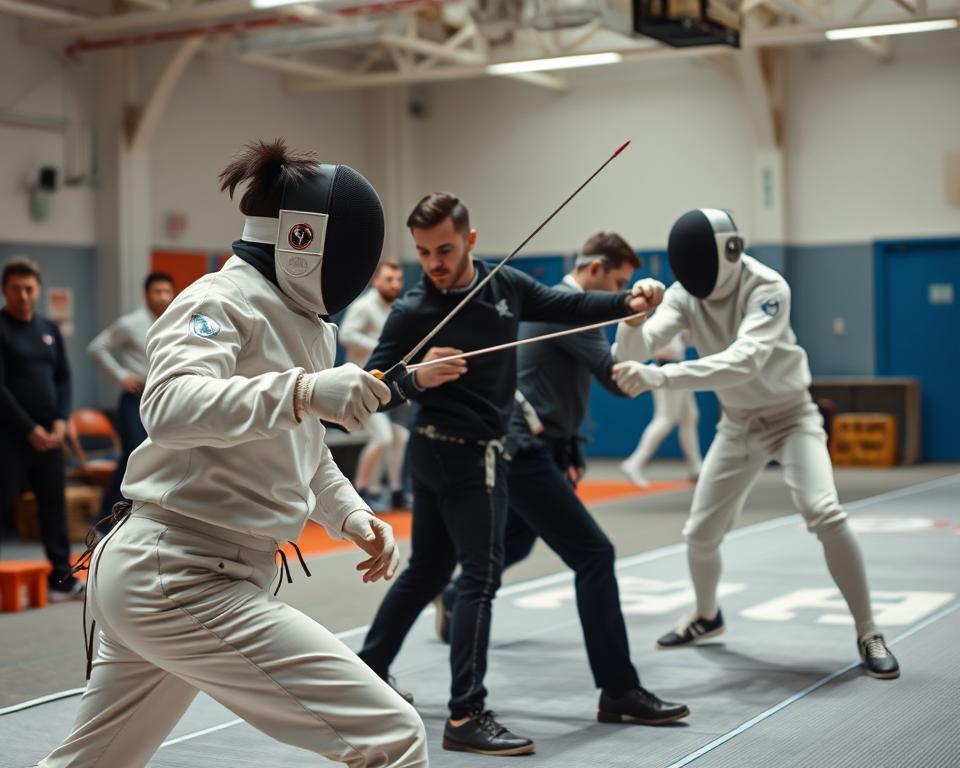
Age Regulations in Other Major Fencing Events
When we talk about age divisions in olympic fencing, we see how age affects the sport. Fencing has age rules not just in the Olympics but also in other big events. These rules help organize competitions by age.
The World Fencing Championships is a top event in fencing. It’s run by the Fédération Internationale d’Escrime (FIE). This event has age groups like cadet, junior, and senior. These match the Olympic fencing olympics age rules.
- Cadet fencers are usually 15 to 17 years old.
- Junior fencers are 18 to 20 years old.
- Senior fencers are 21 years old or older.
Other big events like the European Championships, Pan American Games, and Asian Championships also have age groups. These events help young fencers show their skills and follow the same age rules.
Having the same age groups in big tournaments makes competition fair. It lets fencers of the same age and skill level compete. This helps young talent grow and gives all fencers a chance to shine on the world stage.
Looking at age divisions in olympic fencing and other big events shows how age is important in fencing. It helps us understand the balance between fair play and including everyone in the sport.
Controversies and Debates Around Age Regulations
The age rules in Olympic fencing have sparked a lot of talk. People argue about how to make sure the competition is fair. They want to give chances to athletes of all ages and skills.
Balancing Fair Competition and Inclusivity
One big worry is that fencing olympics age rules might stop young athletes from joining. Young ones might not get to compete if they’re too young. On the other hand, older fencers might struggle to stay competitive as they get older.
The olympic fencing age requirements try to make things fair. But, they can also make some feel left out. It’s a tricky situation for the leaders of the sport. They need to make sure everyone, no matter their age or skill, has a chance to shine.
| Argument for Strict Age Regulations | Argument for More Flexible Age Regulations |
|---|---|
| Maintaining a fair and competitive environment | Promoting broader participation and inclusion |
| Ensuring a level playing field for all athletes | Allowing for individual development and progression |
| Preventing potential safety concerns for younger or older athletes | Recognizing the diverse physical and mental capabilities of fencers |
The debate is ongoing, and the leaders must think carefully about the rules. They aim to keep the sport’s integrity while encouraging all ages to join in.
Conclusion
This deep dive into Olympic fencing’s age rules has shown how important it is to keep things fair and open. The rules set a range for ages, making sure everyone, from beginners to pros, can compete fairly. This helps the sport grow and improve at all levels.
The article looked closely at fencing olympics age and olympic fencing age eligibility. It showed how these rules protect fencers and keep the sport honest. Following these rules helps the International Fencing Federation and national bodies build a strong fencing community. This community welcomes athletes of all ages, from young talents to experienced fencers.
As fencing changes, it’s crucial to keep updating these age rules. Finding the right balance between competition, safety, and chances for everyone is key. This way, fencing can keep thrilling audiences around the globe. It will continue to show the beauty, skill, and determination of its athletes.
